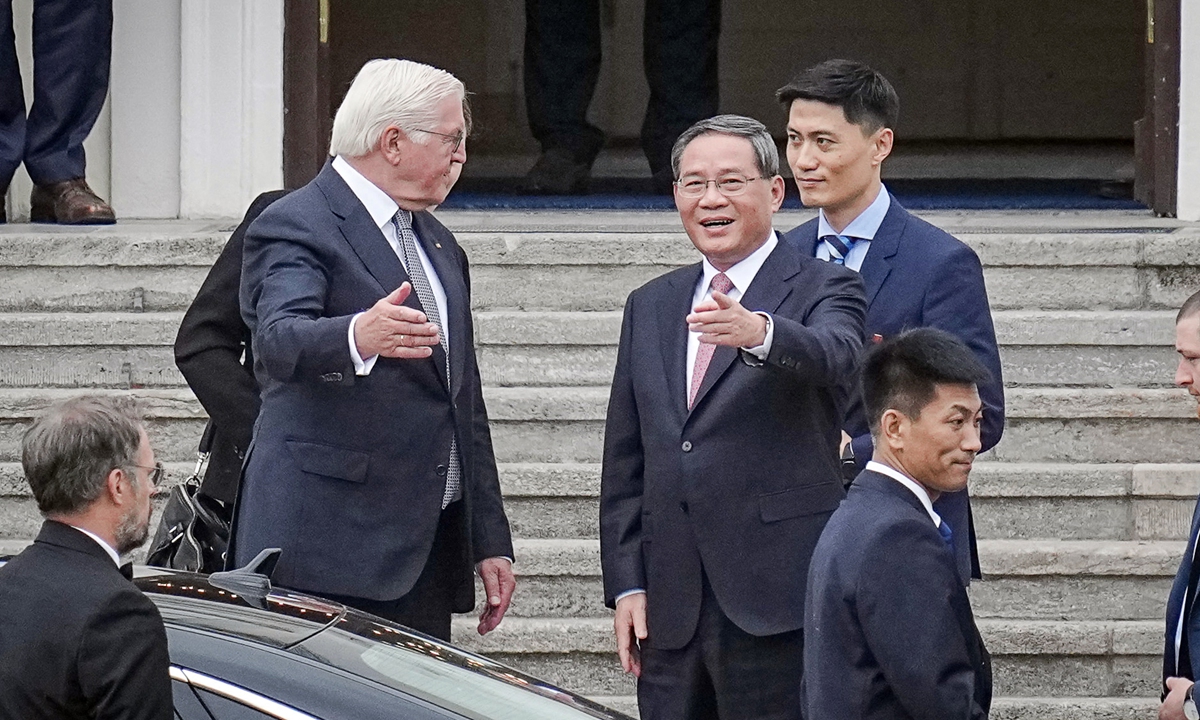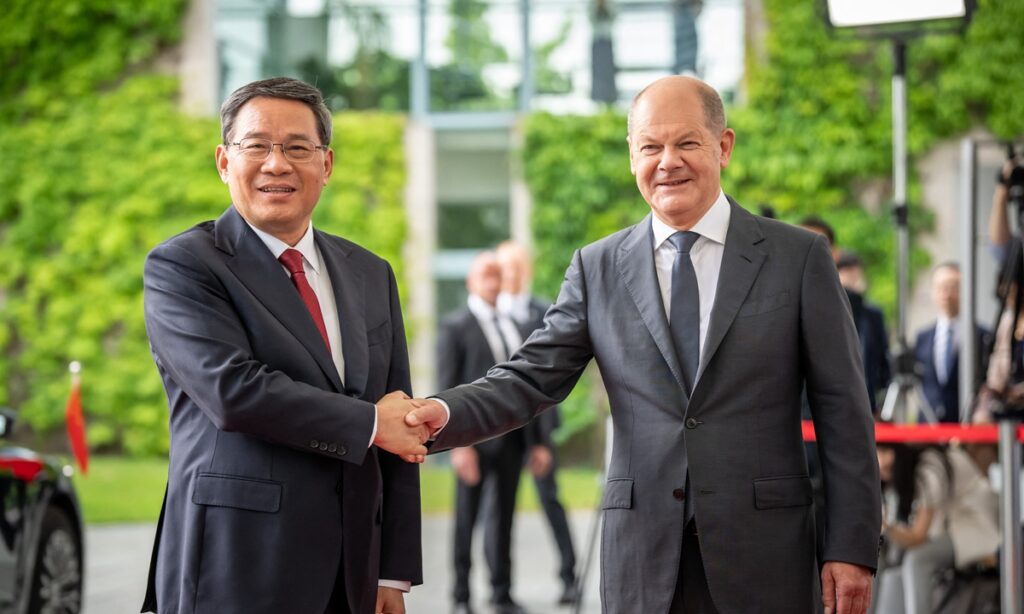Li also highlighted cooperation in trade, people-to-people exchanges, tackling climate change and other areas between the two countries, and said he hopes Germany will keep an open attitude, stick to independence and autonomy, and deal with relevant issues based on international rules.
Experts said Premier Li’s ongoing visit and his talks with the German chancellor will play an important role in stabilizing relations between China and Germany, and preventing their ties from being interrupted by any third party or internal conservative forces amid the complex geopolitical landscape.
They also believed Li’s trips to Germany and France will push China’s ties with Europe in a good direction, defying against the ambiguous, dangerous voice of “de-risking” from certain European politicians. Moreover, US Secretary of State Antony Blinken’s recent trip to Beijing will also stimulate European countries to actively engage with Beijing, and pare back the China hawks in Europe, said experts.
During his talks with Scholz on Tuesday, Li said since the establishment of diplomatic relations 51 years ago, China and Germany have continued to deepen dialogue and cooperation in the spirit of mutual respect and mutual benefit, forged an all-round strategic partnership, and jointly promoted the sound and steady development of China-EU relations.
The Chinese premier vowed that Beijing is willing to work together with Berlin and “take China-Germany relations to a new level.”
He said the achievements on economic and trade cooperation between China and Germany are hard-won, and have brought tangible benefits to the people of both nations. It is hoped that Germany can keep an open mind, stick to independence and autonomy, to handle relevant issues based on the international rules. Li proposed tackling climate change as one of the guiding visions for China-Germany cooperation in the future.
For his part, Scholz stressed that Germany opposes any form of de-coupling, and explained that “de-risking” is not “de-sinicization.” Germany is willing to develop stable relations with China, and deepen bilateral exchanges and cooperation.
Li arrived on Sunday for an official visit to Germany, during which he met German President Frank-Walter Steinmeier on Monday, German business community and was scheduled to co-chair the seventh China-Germany inter-governmental consultation with Scholz.

German President Frank-Walter Steinmeier (left) bids farewell to visiting Chinese Premier Li Qiang (center right) in front of Bellevue Palace after their meeting in Berlin on June 19, 2023.The Chinese premier will also co-chair the seventh China-Germany inter-governmental consultation during the visit. Photo: VCG
Stabilizing ties
Bilateral relations between China and Germany are in a complicated situation as the US is increasing pressure on its European allies to counter China, said Sun Keqin, research fellow at the China Institutes of Contemporary International Relations. He added that the new German government has increased confrontation and competition with China as the two sides are having discrepancies about the solution to the Russia-Ukraine conflict.
Against such backdrop, Li’s visit and talks with German leaders serve to further stabilize ties and prevent noises from interrupting the pragmatic cooperation between the two countries, said Sun.
Actually, both sides are making efforts to maintain stable relations. Scholz was the first European leader to visit China after the 20th National Congress of the Communist Party of China; German foreign minister Annalena Baerbock also visited China this April. Li’s trip to Germany was accompanied by Chinese Commerce Minister Wang Wentao and other high-level officials, which is seen by experts as an in-depth, effective trip of communication, which is expected to achieve further and deeper results.
Li’s arrival in Berlin coincided with Blinken’s trip to Beijing, aimed at reducing tensions with China. Scholz welcomed the visit as “a good sign for an urgently needed normalization of relations,” the Associated Press reported.
The US is a major factor for the difficulties in China’s relationship with Europe, now European countries see that the US is actively seeking to engage with China, so why can’t we, said Sun. He believed this visit serves as a great encouragement for some German politicians who advocate rational and pragmatic relations with China.
During Li’s ongoing visit to Europe from June 18 to 23, the first overseas trip since he became the Chinese premier in March, Li will also pay an official visit to France and attend the Summit for a New Global Financing Pact, following his trip to Germany.
The visit comes as Europe and Germany consider how best to handle China relations. Recently, several Western European nations have taken an issue with a presentation of European Commission President Ursula von der Leyen’s road map for “de-risking” economic ties with China, and diplomats from France, Germany, Italy and the Netherlands were among those expressing concerns, media reported.
During his meeting with German President Frank-Walter Steinmeier on Monday, Li said the biggest risk is non-cooperation and the biggest hidden security danger is non-development.
Some politicians in Europe are seeking to restrict cooperation with China, allowing confrontation to prevail over cooperation; such proposal risks to widen the conflict between China and Europe whilst shrinking room for collaboration, Cui Hongjian, director of the Department of European Studies at the China Institute of International Studies, told the Global Times, warning the proposal will bring more risks to bilateral relations.
He pointed out that Li’s remarks on risks from non-cooperation and non-development are a reminder for European countries not to get caught up in the mentality of antagonism.
Vast room for cooperation
During his visit, Li also met representatives from the German business community.
Enterprises should be restored to the driving seat in terms of risk prevention, and risk prevention and cooperation are not opposites, Li said while attending the seminar with representatives of the German business community.
Representatives of German companies including Siemens, Volkswagen, Mercedes-Benz, BMW, Schaeffler, BASF, Covestro, Wacker Chemie, Merck, SAP and Allianz attended the meeting.
Noting that it is understandable that all parties have their own security concerns, Li said what is important is how to reasonably define and guard against risks.
“Li’s down-to-earth approach in his first visit overseas as well as his focus on pragmatic cooperation and development is expected to dispel some European countries’ security concerns and serve as a dose of sobriety to countries that overly seek so-called national security,” Zhang Shengjun, director of the Institute of International Relations at Beijing Normal University, told the Global Times on Tuesday.
German entrepreneurs are playing important roles in the relationship with China. They view confrontation with China as irrational as the Chinese market is crucial for their businesses, said Sun, adding that their voices are increasingly respected and valued by the German government.
A number of German companies have expanded their presence in the Chinese market in recent years, despite mounting US’ pressure on them to diversify away from China as certain politicians are trying to reduce the so-called reliance on China.
For example, Siemens’ Chief Executive Roland Busch said during his recent trip to Beijing that the company wants to expand investment in China, and further strengthen cooperation with China.
While Germany faces a looming deindustrialization as a result of its “de-risking” policy, the German economy has entered a technical recession with data showing that the economy contracted in the first quarter of this year.
“Amid unprecedented changes unseen in a century, every country faces multiple uncertainties in their development, with both risks and opportunities. However, countries shouldn’t promote protectionism and anti-globalization in the name of ‘de-risking,'” Yang Xiepu, director of China-Germany Cooperation Center of Chinese Academy of Social Sciences, told the Global Times on Tuesday.
The cooperation and mutual development between China and Germany conform to a historical trend, need of the times and the benefits of all mankind. China-Germany bilateral investment and cooperation should be further strengthened to stop a fall in two-way investment. In addition to traditional sectors like machinery manufacturing, automobiles and chemical, China and Germany should strengthen cooperation in sectors like smart manufacturing, green economy and climate change, Yang said.
In 2022, trade between China and Germany reached 298 billion euros ($320 billion), up 21 percent year-on-year and marking a new record, according to data from the German statistics office. China has become Germany’s most important trading partner for the seventh year in a row.
“It’s highly expected that Germany will use its leading role in the EU to boost mutual trust and cooperation between China and the bloc following Li’s visit,” Zhang said.
(Global Times)




